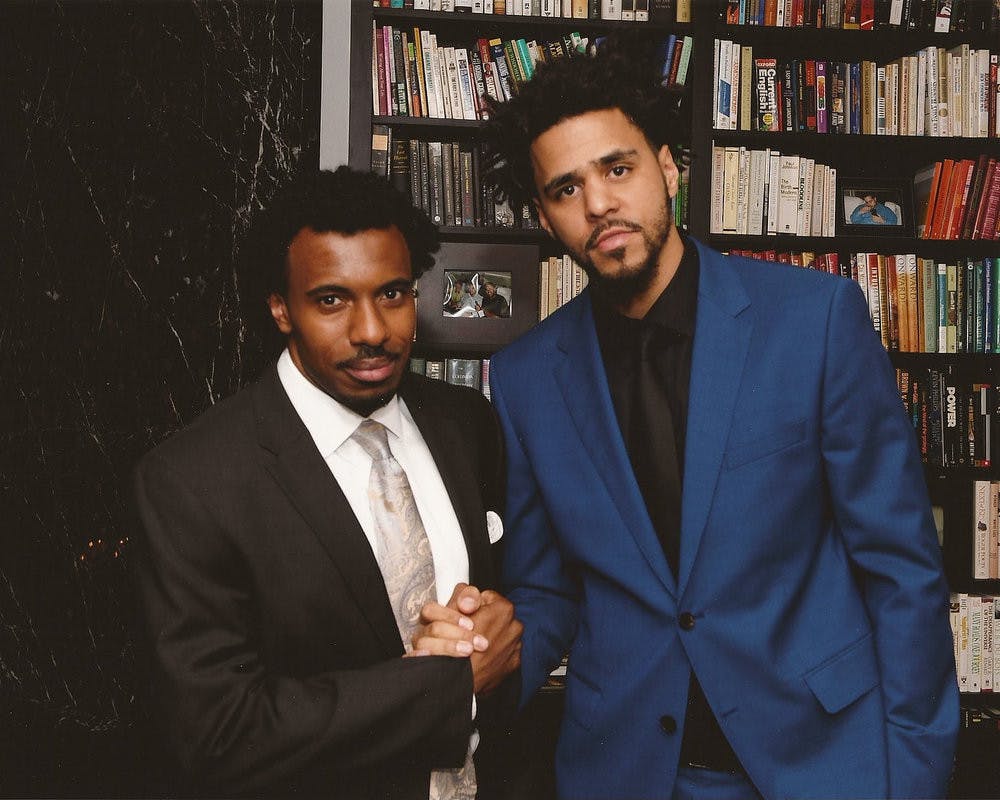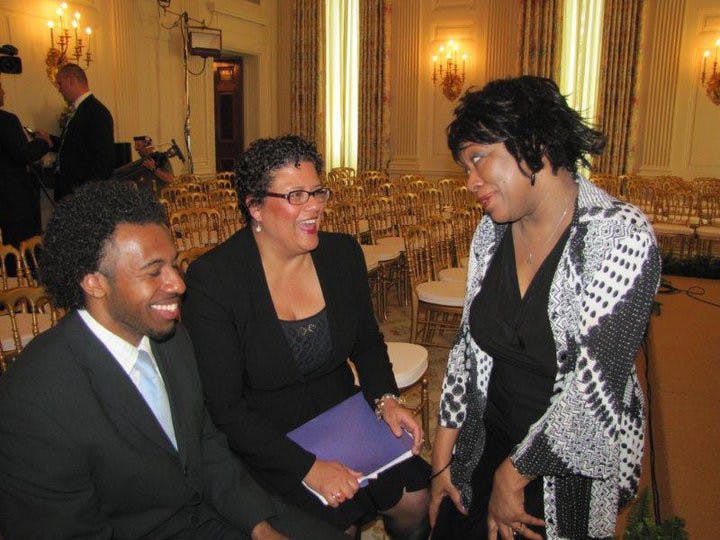BY: CRAIG STEVENS
As American University makes strides to diversify its student body, the number of black faculty remains disappointingly low. The Office of Institutional Research and Assessment last year reported that, out of 862 full-time faculty at AU, only 41 identify as "Black/African American."
While we maintain our focus upon strategies to combat this issue, it's important to celebrate the men and women who have found avenues of perseverance. For this reason, The Blackprint will be spotlighting some of the great black professors here at AU.
The main goal of a liberal arts education is to expose students to a wide array of disciplines, opinions and perspectives. As students, it's our duty to engage the professorial diversity that we have here at this university. We hope that this series can serve as a guide as you choose your General Education courses or undecided credits.
The first in this series is Professor Kyle Dargan. Dargan teaches courses in the Department of Literature and serves as the director of creative writing. His poetry and nonfiction have been published in The Denver Quarterly, Callaloo, Jubilat, The Newark Star-Ledger, The Root, Ploughshares and Shenandoah.

Craig Stevens: Where are you from?
Kyle Dargan: Newark, New Jersey. I went to Rutgers for one year, but the plan was always to be elsewhere so I left a scholarship there to attend the University of Virginia.
CS: How would you describe your undergraduate experience at UVA?
KD: It's a good place there. But when I see some of the stuff going on at AU in terms of racial tensions and I think about the stuff that was happening when I was in school down at UVA, it's still sadly similar.
CS: What kind of work do you do?
KD: I write poetry, I write fiction, non -fiction - but I've published more poetry. I feel like writers write. It's not so much that if you write poetry that's all you do, or if you write poetry you're only informed by poets. So I try to constantly read and write other things. I write about growing up in New Jersey. I'm starting to write more about being in D.C., and now writing more about living in Southeast D.C. as an African American person in the only remaining African American area of D.C. Also the difficulties of the situation, since I am a professor and the class divide you know - is it gentrification if you're brown?
CS: That's an interesting perspective. So what is your role in interacting with and speaking to issues of gentrification?
KD: I think it's telling people to prepare for the change. You know, people get comfortable in their neighborhood saying, ‘Oh you know, white people aren't coming over here' but I'm sure they said the same thing about U St. 12 years ago, and now you walk down U St. and you'll probably have a hard time finding any African American homeowners. We need to be talking about holding our representatives accountable. This is D.C. so there's no representatives, but senators and council people need to be held accountable. It's not just about giving out turkeys at holidays and building a rec center, but what are you doing to ensure that people can stay here? If you want people to stay in D.C. you have to train them and provide them opportunities to stay in D.C., but this doesn't happen. I think a lot of black people, even myself, wind up feeling like a placeholder, but we're not placeholders. We deserve to be in the city as much as anyone else.

Professor Dargan at the White House with his former teacher and former Poet Laureate Rita Dove, as well as Obama Inaugural Poet Elizabeth Alexander.
CS: Did you always see yourself becoming a writer?
KD: A writer yeah, but that can take many forms. But if you asked me did I see myself being a professor or higher ed administrator - no, that really wasn't in the plan.
CS: So how did this come about?
KD: I was [in D.C.] studying after I got my first masters, studying non-profit arts management. I thought I was going to get into either that or publishing.
But while I was at AU studying as a grad student, I started teaching and it provided me stability which is a huge thing as an artist. To not be constantly thinking about where's that next check, you know? That gives you a lot of space to create; so I just rode that for a while. I was able to be really productive. Between the ages of 24 - 30 I got out like three books. And I got out another one in 2015. So I just tried to maximize that, cause you don't always get those kinds of opportunities to be in a place where you have support. But I really just figured out that I liked D.C. Even though it's changed a lot over the last 10 years. You know, I was able to find communities that I could stumble into 10-12 years ago, but now you have to really look for them, even though it's changed my attitude towards D.C., I still feel like those communities are here. So it just made sense for me to take the job to stay and do this work.

Professor Dargan at a release and signing for his last book, "Honest Engine"
CS: Do you have a place in DC where you feel most creative?
KD: Probably now it's my house because I created that space. But I used to live down in Glover Park. But when I was thinking about where I wanted to settle, I decided I wanted to be someplace that was kind of like Newark [New Jersey], which isn't this area of town. I remember I'd be walking around Glover Park sometimes and the police cruisers would be following me around. So, you know just being in Southeast - it's so far away, its own world. It's a black world really in a lot of ways.
Though, a lot of those people there are the ones that work in the Capitol for instance. They do all the things that keeps D.C. moving, they're just not the people on the screen. So in that way [Southeast] is really connected to the heart and soul of D.C. but it's not really connected to the superficial elements of it. So when I'm over there I'm often dealing with people that aren't involved in the minutia and nonsense of academia, it's just on the ground and that keeps me sane. I need that; it keeps me grounded.
CS: Do you have a message for the student body?
KD: People don't realize it but creative writing is one of the most important things you do in your life. When you apply for college and write that essay - that's creative writing. When you send that text message - I'm not on Tinder - but when you send a message to someone asking them out on a date - that's creative writing.
You send that letter for a job - creative writing, a speech - creative writing. What we do over here, what I like to call creative communication, connecting to someone else through language, is usually important. So yeah we practice that with poems and stories and essays but every day that's the tool that you're gonna need going forward. You know it's a war for hearts and minds, and one of the biggest weapons in that war is language and communication. And that's what we do here, help put yourself in touch with your own humanity through creative writing. Yeah you leave here with your degree and your laurels, but none of that matters if you lost your humanity in the process. So we gotta find ways to hold on to that and I think creative writing and communication really does that.
Next semester, Professor Dargan is teaching: LIT-401 / LIT-215 / LIT-107


